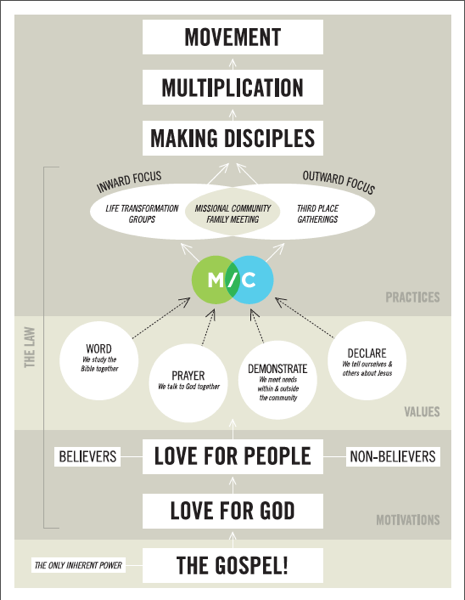In this series of posts, I am going to unpack the strategy and structure of leadership development we have implemented at The Austin Stone for missional communities. I’ll be looking at:
- Introduction
- Discipleship and Leadership Development
- Identifying Leaders – Two Different Methods
- Questions to Ask When Considering a Leader
- The Basic Qualifications for Leadership
- Basic Training for Missional Communities
- Ongoing Training for Leaders
- Caring for Leaders
—–
Basic Training for Missional Communities
As we have been working out missional communities at The Austin Stone for the last 5 years, we have tried a number of different training methods – sermons with integrated group study materials, practical skill training, theological teaching, on the job training, digital media resourcing, cohort-based adult learning, and case study driven discussion. Pretty much you name it, and we’ve tried it.
Through the process of experimentation, we’ve found that it’s important to have a consistent basic training that everyone participates in. The primary objective in this training is three-fold:
- Create a compelling desire for missional community, rooted in the gospel
- Deconstruct predominant paradigms that people have about community
- Introduce basic rhythms and practices of missional community life
Train the whole community, not just the leader
Training the community together is helpful for two reasons – it allows the leader to focus on specific application of concepts into their community, and secondly, the whole community is exposed to the whole vision.
Below is an overview of the concepts we work through:
The Roadmap
In leading communities towards a movement of multiplying disciples, we have had to be explicit about how the practices we commit to are rooted in our values, which are based on our motivations that flow from the gospel. The MC Roadmap below presents a visual representation of how our training fits together – the gospel foundation, gospel motivations, missional community values, and missional community practices.
Having this visual tool helps people we are training see the whole picture – how our theology leads us to healthy practice. We spend 4 weeks, 2.5 hours per session and focus on each area theologically, philosophically and practically.
Practically, all of our training is done through a combination of teaching, processing activities, group discussion, and integrated homework.

The Gospel
In our first session together, we focus our time exclusively on the gospel of Jesus. As church leaders, we often have the tendency to assume the gospel and move beyond it into practical application, but we have found within our body only about 20% of people can give a spontaneous, biblical answer to the question “what is the gospel?”
In an effort to always be explicit, we teach the gospel through two different lenses:
- The biblical content of the gospel of Jesus Christ from 1 Corinthians 15:1-7
- A framework for the gospel using the rubric “God, Man, Christ, Response”
Gospel Motivations
In our second session, we work through how the gospel changes us in our hearts affections. Because of the work of Christ, we now are able to fulfill the Great Commandment to love God and love our neighbor. We have a new motivation based on our new identity in Christ.
Practically, we work through our identity as brothers and sisters in Christ, and that our community is to be inclusive of those who are far from God. Our love for one another in the body of Christ is grown by our consistent involvement in God’s mission to the lost.
Missional Community Values
Based on God’s work in Christ on our behalf and our new identity in Him, our community has a set of values that are derived from our identity and motivations. Because we love God, we love His Word and prayer. Because we love people, we demonstrate the gospel and declare the gospel. These values infuse our life together – they are present in all areas of our life.
On a practical note, we work through specifically how these new values demand that we think differently about community, particularly using an exercise we call “Who is the Missionary?”
Missional Community Practices
Lastly, we spend time working through the healthy practices of missional communities, share stories of the ways it has worked out in real life, and answer practical questions that folks have.
We also provide tangible next steps for each community in clarifying their mission, and their next steps as a community. We try to keep this session light on didactic teaching, and very heavy on dialogue and Q&A.
Conclusion
Although we don’t cover every detail of missional community life in this training, we have found that it gives most people a degree of understanding, and more importantly a desire for gospel-centered community on mission. This training has been an effective tool in changing the culture of community at The Austin Stone, and forms the bedrock for our life together in the years to come.
What have you found to be helpful in training communities?
Leave a Reply to Todd EngstromCancel reply